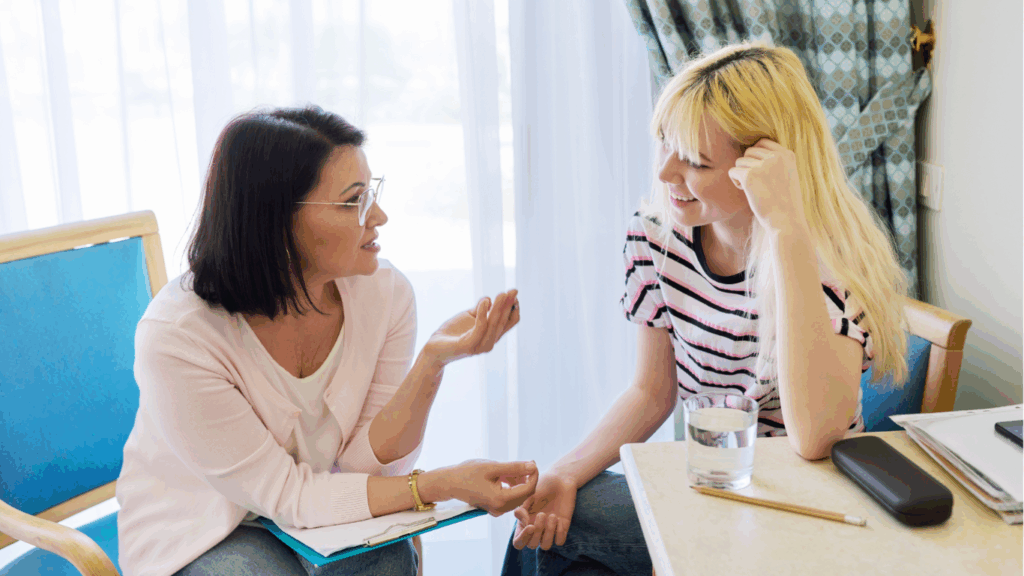Between school drop-offs, late-night worries, and endless to-do lists, caregiving can pull you in every direction at once. But caring for others starts with caring for yourself. When you take even a few minutes to rest or breathe, you’re not stepping away from your role — you’re strengthening it.
The truth is that self-care doesn’t have to be long or complicated. Even five minutes a day can help restore your energy and resilience. Here are a few practical ways to start small:
- Guard your sleep
Before trying new routines, check the basics. Are you getting enough sleep to feel rested? And just as importantly, are you protecting that rest from late-night scrolling? Many of us find ourselves reaching for our phones before bed, even when we know it affects our sleep.
In the article How electronics affect sleep, the Sleep Foundation explains that blue light from phones, tablets, and TVs can delay the release of melatonin. Melatonin is the hormone that helps you fall asleep. When it’s delayed, it can be harder to drift off and stay asleep.
To help prevent this, put screens away at least 30 to 60 minutes before bed. Doing so can improve your sleep quality and boost your energy the next day.
- Move your body
You don’t need a gym membership or a long workout to feel better. Light activity, such as stretching, walking around the block, or doing gentle yoga, can help reduce stress and lift your mood.
The World Health Organization notes in its Guidelines on Physical Activity and Sedentary Behaviour that “doing some physical activity is better than doing none.” Even small amounts of regular movement support both mental and physical health, especially during busy times.
If you can, schedule movement the way you would an appointment. If that’s not possible, walk while you talk on the phone, stretch while the kettle boils, or take a few minutes to move between tasks. Small steps add up and make a real difference over time.
- Try a five-minute breathing exercise
When life feels overwhelming, a few minutes of focused breathing can make a real difference.
A 2023 study from Stanford Medicine found that a technique called cyclic sighing reduced anxiety and improved mood more effectively than mindfulness meditation or other breathing practices.
Cyclic sighing is a type of controlled breathing that includes a long exhale. Here’s how to try it:
- Inhale through your nose until your lungs feel comfortably full.
- Take a second, smaller inhale to expand your lungs completely.
- Exhale slowly through your mouth until all the air is gone.
Repeat for five minutes. You can do this while waiting in the car, before bed, or during a short break. Small pauses like this help calm the body’s stress response and restore your energy throughout the day. You can learn more about cycle sighing here.
- Take a few minutes to journal
Writing your thoughts in a journal or notes app is an easy way to care for yourself. It can help you release built-up emotions and lower stress and anxiety. A 2018 study published in the Journal of Medical Internet Research found that emotion-focused journaling was linked to lower mental distress and greater well-being.
Here’s how to begin:
- Set aside three to five minutes and write freely about how you’re feeling or what’s on your mind.
- Try prompts like “What’s on my mind right now?” or “What am I grateful for today?”
Don’t worry about grammar or getting it right. This is just for you. Even a few minutes of reflection can help you notice patterns, release tension, and feel more centred.
5. Connect with other caregivers
You don’t have to do this alone. Joining a peer support group can ease isolation and help you feel understood. Talking with others who truly get it can reduce stress, build resilience, and remind you that you’re part of a caring community.
The Public Health Agency of Canada notes that social connection is a protective factor for both mental and physical health. It helps caregivers recover from stress and avoid burnout.
Did you know the Belonging Network offers Facebook groups, drop-in sessions, and other online support groups where adoptive, foster, and kinship caregivers can connect, share experiences, and find understanding? Visit our online support groups page to learn more and join a group.
The takeaway: start small, stay consistent
Self-care isn’t about adding another big task to your already full plate. It’s about weaving in small, sustainable habits that keep you grounded and strong. The healthier and more supported you are, the more capacity you’ll have to give to your children.





